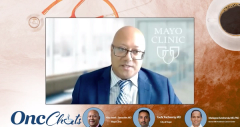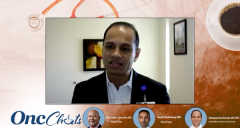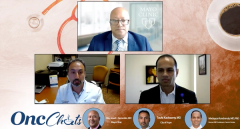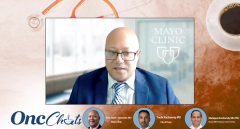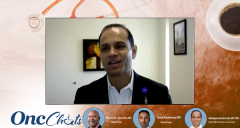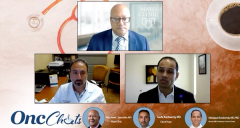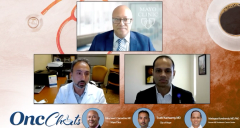
Examining the Promise of Multicancer Early Detection Tests: Takeaways From the ECLIPSE Trial
In this sixth episode of OncChats: Examining the Promise of Multicancer Early Detection Tests, Toufic A. Kachaamy, MD, Madappa Kundranda, MD, PhD, and Niloy Jewel J. Samadder, MD, discuss important takeaways from the ECLIPSE study (NCT04136002), which evaluated a cell-free DNA blood-based test for colorectal cancer in an average-risk population.
Episodes in this series

In this sixth episode of OncChats: Examining the Promise of Multicancer Early Detection Tests, Toufic A. Kachaamy, MD, Madappa Kundranda, MD, PhD, and Niloy Jewel J. Samadder, MD, discuss important takeaways from the ECLIPSE study (NCT04136002), which evaluated a cell-free DNA blood-based test for colorectal cancer (CRC) in an average-risk population.
Kachaamy: Thank you for that. [After] Digestive Disease Week ended, results from the ECLIPSE study were reported. The shield blood test was found to be 83% sensitive and 90% specific for CRC in average-risk patients and the majority were detected early. A screening colonoscopy detects a lot of precancers, so prevents cancer, vs these tests that are detecting cancer. Do you see that changing the way we do screening for CRC, like with patients who want to prevent cancer? What’s your opinion on this?
Samadder: [These are] exciting data that were presented at Digestive Disease Week and I think it is going to add to our range of options we can give patients. I do not see this test replacing colonoscopy nor do I see it truly replacing multitarget stool DNA or even FIT testing; each one has its role in CRC screening. For the audience, what is this study that we’re talking about? This was the pivotal study done by Guardant [that looked] at their blood-based assay. This is an example of, not a MCED [test], but a single-cancer early detection test, because it’s only screening for CRC.
They enrolled over 10,000 patients, but the valuable subject population was about 7800 patients who had the blood test and then a colonoscopy soon thereafter and could be assessed.There was a total of 65 CRCs that occurred in this population that they followed, resulting in a sensitivity for CRC of 83%. When they calculated specificity of 90%, that was for colorectal neoplasia, which was a combination term of CRC plus advanced adenomas, so large adenoma, large sessile serrated polyps, as well as high-grade dysplasia and those with significant villas histology.
One of the key parts of the presentation that I took home is that this test has very high sensitivity for stage III and IV cancer, but for stage I, it did not work as well; [here, the] sensitivity [was] 55%. This really comes back to what you just mentioned: What is the goal of CRC screening? Is it to identify cancer, which can hopefully then be treated at an earlier stage with less toxic or less invasive surgeries, or is it to detect early precancer, which can be removed completely, preventing the development of invasive cancer? That, I think, will be a decision that every patient and their provider will make together.
This test will have a role for patients who are unwilling or unable to undergo colonoscopy for a variety of reasons. We know, even looking at the entire population, that only about 60% of patients undergo any CRC screening at all—whether that’s colonoscopy based, or imaging based with virtual CT colonoscopy. As such, there is room to get additional patients who can be screened in some context with a blood-based test that could be done simply when they’re going to their primary care physician for an annual visit. It will not reliably detect precancers. The sensitivity for advanced adenomas, essentially advanced lesions, with this product was only 13%. As such, it is not a product that’s going to replace the ability to detect precancer and remove them to reduce cancer incidence; it may lead to stage shifting [though]. It’s going to be amongst our armamentarium of products based on the patient’s willingness to undergo cancer screening; their comorbidities and willingness to undergo more invasive procedures, such as colonoscopy; sedation risk; how long they want to go in between procedures or cancer screening; as well as their interest in doing some kind of stool-based test, whether that’s FIT or stool DNA and virtual CT. It is going to add to the armamentarium.
Kundranda: That’s a great point, Dr Samadder, because this is yet another tool in our toolkit, right? It’s unlikely that we will find the silver bullet, or a one-size-fits-all kind of thing here.
Check back on Wednesday for the last episode in this series.


